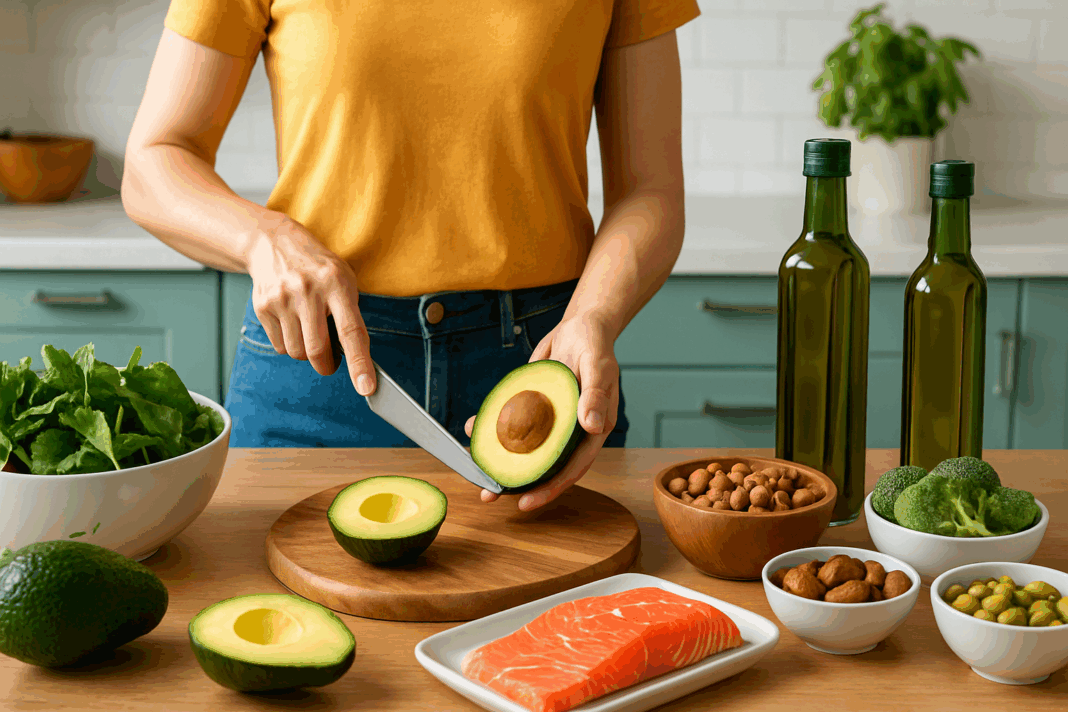In today’s health-conscious world, mastering the art of keto diet meal prep has become more than a convenience—it’s a necessity for anyone pursuing sustainable low-carb living. The ketogenic diet, known for its emphasis on high-fat, moderate-protein, and very low-carbohydrate intake, is not just a passing trend; it is a medically endorsed approach with a growing body of evidence supporting its role in weight loss, metabolic health, and even certain neurological conditions. However, the success of this lifestyle hinges on consistency, planning, and the ability to execute balanced meals without resorting to last-minute compromises. Keto diet prep is the foundation that enables dieters to avoid the pitfalls of high-carb convenience foods and stay aligned with their nutritional goals.
At the heart of long-term adherence to a ketogenic lifestyle is keto food prep—the process of preparing meals in advance that meet strict macronutrient ratios. For busy professionals, parents, and anyone juggling a demanding schedule, this proactive approach saves time and removes the uncertainty around what to eat, which is often the downfall of restrictive diets. More importantly, effective keto prep meals are not only about carbohydrate restriction but also about achieving nutritional adequacy, satiety, and enjoyment. A well-prepared keto dish is not just fuel; it’s a nourishing experience that supports both body and mind.
You may also like: Is the Keto Diet Safe or Dangerous? What Experts Say About the Risks, Benefits, and Basics of the Ketogenic Diet
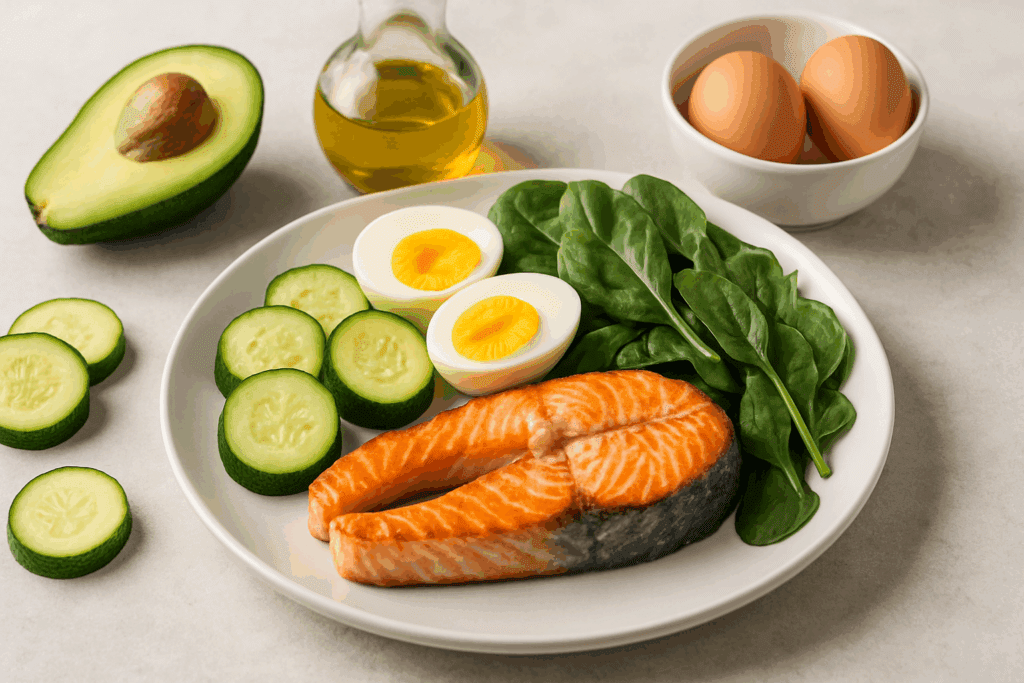
Understanding the Nutritional Foundation of Keto Prep Meals
A key part of keto diet prep is understanding the nutritional foundation that underpins the diet itself. This includes knowing your macros: roughly 70-75% of calories from fat, 20-25% from protein, and only 5-10% from carbohydrates. When prepping keto meals, the goal is not only to reduce carbs but to do so in a way that promotes optimal energy levels, prevents nutrient deficiencies, and supports metabolic flexibility. High-quality fats like avocado oil, olive oil, grass-fed butter, and coconut oil become essential tools in your kitchen arsenal.
It is equally important to distinguish between good and poor fat sources. Not all fats are created equal, and relying heavily on processed meats or hydrogenated oils can undermine the health benefits of the ketogenic approach. When planning keto food prep, think in terms of whole, unprocessed ingredients. Incorporate nutrient-dense vegetables such as leafy greens, zucchini, cauliflower, and Brussels sprouts. These foods are not only low in carbohydrates but also rich in fiber, antioxidants, and vitamins that are often lacking in carb-restricted diets.
Protein, while moderate in a ketogenic regimen, should still be of high biological value. Eggs, salmon, grass-fed beef, and poultry are excellent choices that provide essential amino acids while keeping insulin levels stable. The interplay between fat and protein is delicate in keto diet meal prep, as an overemphasis on protein can inadvertently increase gluconeogenesis, potentially pushing the body out of ketosis. By planning meals with this balance in mind, you create a sustainable framework for dietary success.
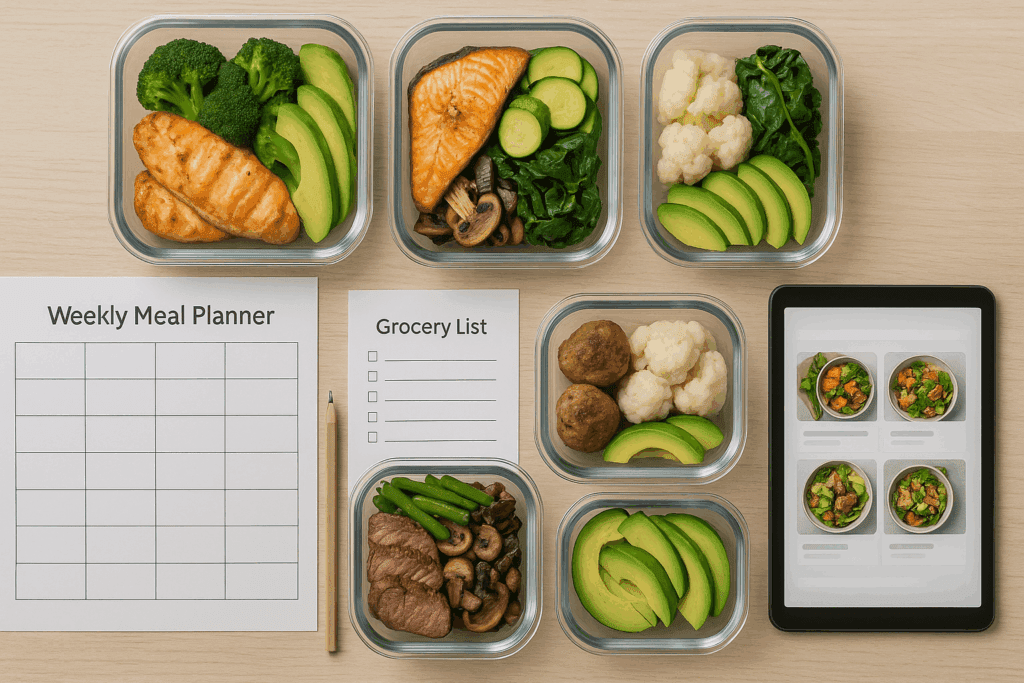
Strategic Planning: The Key to Keto Diet Meal Prep
Effective keto diet prep begins with strategic planning, which goes far beyond simply choosing recipes. It starts with understanding your caloric and macronutrient requirements, which vary based on age, gender, physical activity, and health status. Tools like keto macro calculators or consultations with a registered dietitian can help you define these needs accurately. Once your targets are clear, meal planning becomes a more focused, purposeful activity.
When planning your weekly meals, variety and rotation are crucial to preventing burnout. Rotating different proteins, vegetables, and fat sources ensures you receive a spectrum of nutrients and keeps your palate engaged. The planning phase should also include prepping shopping lists, scheduling meal prep days, and deciding on proper storage techniques to extend freshness. This type of foresight allows keto prep meals to become a seamless part of your lifestyle rather than a constant chore.
Batch cooking plays a central role in meal prep efficiency. Dedicating one or two days a week to preparing several dishes allows you to create a bank of ready-to-eat meals that align with your keto goals. Items like casseroles, soups, stews, and roasted meats lend themselves well to freezing and reheating without significant loss of quality or flavor. This approach minimizes daily decision fatigue and increases your likelihood of staying in ketosis.
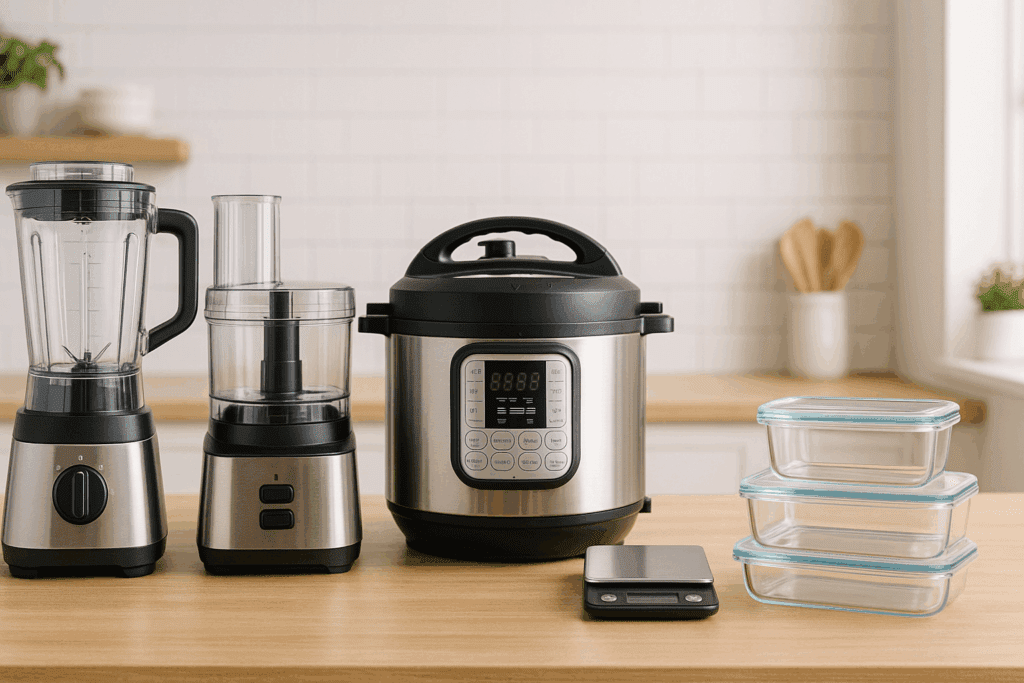
Essential Kitchen Tools for Successful Keto Food Prep
Having the right tools at your disposal can significantly elevate your keto food prep game. While you don’t need a professional kitchen setup, a few key appliances can make a world of difference. A high-powered blender or food processor allows you to create keto-friendly sauces, nut butters, and even low-carb baking mixes. An instant pot or slow cooker is invaluable for batch cooking meats and soups with minimal supervision.
Portion control containers, meal prep trays, and a reliable digital food scale help ensure that your meals are aligned with your macronutrient goals. These tools support accuracy, which is vital when carb limits are tight. Glass storage containers are preferable to plastic, as they are more durable, better at preserving freshness, and free from potentially harmful chemicals like BPA.
In addition to gadgets, having an organized kitchen space streamlines your prep process. Designate specific zones for prep, cooking, and storage. Keep frequently used items such as olive oil, spices, and keto-approved condiments easily accessible. An efficient kitchen layout reduces time spent searching for tools and ingredients, making the process more enjoyable and less time-consuming. As meal prep becomes a routine part of your week, these small details compound into significant time savings and improved consistency.
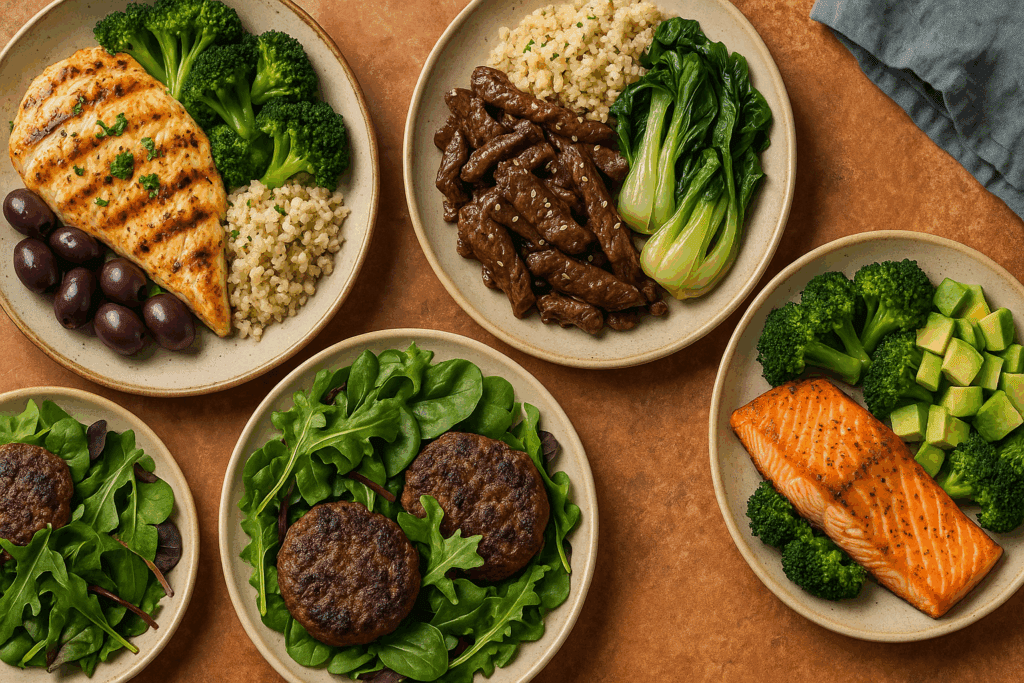
Crafting Balanced, Flavorful Keto Prep Meals
The misconception that keto food prep is bland or repetitive often discourages new adherents. However, crafting meals that are both balanced and flavorful is entirely achievable with a thoughtful approach to ingredient selection and preparation methods. Start by choosing a flavor profile for each week—such as Mediterranean, Asian-inspired, or classic American comfort food—to guide your recipes and create cohesion among your meals.
Use herbs, spices, and keto-compliant flavor enhancers like lemon juice, apple cider vinegar, and tamari to bring depth to your dishes. Incorporating various textures, such as creamy avocado, crunchy nuts, and roasted vegetables, also enhances satisfaction and minimizes cravings. Remember that flavor does not have to come at the expense of macronutrient goals. With the right seasoning and cooking techniques, even a simple grilled chicken breast and salad can become a gourmet keto experience.
Another way to add variety is to utilize different cooking methods. Roasting, grilling, sautéing, and even air frying can dramatically change the taste and texture of the same ingredients. These techniques allow you to make the most of a single batch of food by presenting it in different ways throughout the week. This diversity reduces palate fatigue and supports long-term adherence to the keto diet prep strategy.
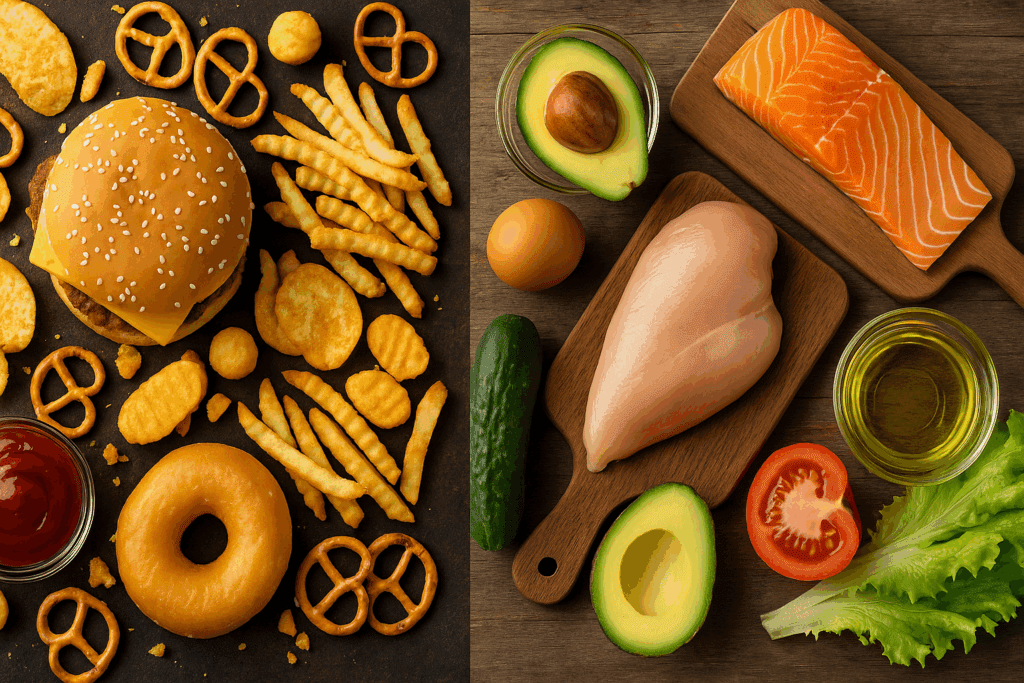
Avoiding Common Pitfalls in Keto Diet Prep
Even the most well-intentioned keto dieters can stumble if common pitfalls are not recognized and proactively addressed. One of the most frequent issues is underestimating carb content in sauces, dressings, and packaged foods labeled “low carb.” Reading ingredient labels carefully and making homemade versions of condiments can help avoid accidental overconsumption of sugars or starches that sabotage ketosis.
Another common mistake is inadequate electrolyte intake. As the body transitions to a ketogenic state, it excretes more sodium, potassium, and magnesium, which can lead to symptoms such as fatigue, cramps, and headaches—often misinterpreted as “keto flu.” Including mineral-rich foods like leafy greens, nuts, seeds, and bone broth in your keto prep meals is a strategic way to maintain electrolyte balance without relying on supplements alone.
Relying too heavily on keto desserts or snacks, even if they are technically compliant, can also derail progress. These items should be considered occasional treats rather than staples, as they can perpetuate sweet cravings and displace more nutrient-dense options. By focusing your keto diet prep on whole foods and meals rather than packaged alternatives, you build a stronger foundation for long-term success.
Making Keto Food Prep Work for Your Lifestyle
Keto food prep is not a one-size-fits-all endeavor. It must be tailored to your schedule, family preferences, and lifestyle constraints to be sustainable. For those with demanding workweeks, meal prep may mean cooking on Sundays and portioning meals for the entire week. For others, it could involve preparing just enough for a few days to allow room for spontaneity or dining out.
Families with children or mixed dietary preferences can still benefit from keto prep meals by choosing versatile base ingredients. For example, grilled chicken, cauliflower rice, or zucchini noodles can be served with different sauces or toppings to accommodate various tastes without requiring multiple entirely separate meals. This strategy minimizes kitchen time while ensuring everyone at the table is satisfied.
Moreover, consider using digital meal planning platforms that offer keto-specific filters and grocery list generation features. These tools streamline the process, help eliminate food waste, and make staying on track less of a burden. Ultimately, customizing your keto diet meal prep to align with your personal rhythm is the key to maintaining consistency without feeling deprived or overwhelmed.

Sustaining Long-Term Success Through Consistency and Mindset
While the technical aspects of keto food prep are critical, mindset plays an equally important role in sustaining long-term success. Viewing meal prep not as a rigid obligation but as an act of self-care can shift your entire experience. Each prepared meal is an investment in your health, energy, and clarity. It is a statement of your priorities and a step toward the life you envision for yourself.
Setting realistic goals and allowing flexibility in your approach prevents burnout. There will be weeks when you can only prep a few meals in advance, and that’s perfectly acceptable. The key is to avoid perfectionism and focus instead on progress. Every small step toward consistency builds the habits that support metabolic health, weight management, and overall well-being.
Additionally, tracking your meals and symptoms can provide valuable insights. Over time, you may notice patterns related to energy levels, mental clarity, or digestion that inform future meal planning. This feedback loop empowers you to refine your keto diet prep strategy based on your body’s responses, making the process not only more effective but also more intuitive.
The Role of Community and Support in Keto Prep Success
Embarking on a ketogenic lifestyle is a personal journey, but it doesn’t have to be a solitary one. Building or joining a community of like-minded individuals can provide inspiration, accountability, and fresh ideas for keto prep meals. Whether through online forums, local cooking groups, or social media communities, connecting with others can enhance your motivation and introduce you to new recipes, techniques, and strategies.
Having a support system also makes it easier to navigate challenges such as social gatherings, travel, or emotional eating. Sharing your wins and setbacks fosters resilience and reminds you that sustainable change is a collective experience. Moreover, involving family members or friends in your keto food prep routine can turn it into an enjoyable activity rather than a solo task.
As you deepen your commitment to keto diet meal prep, mentorship opportunities may also arise. Guiding others who are new to the lifestyle reinforces your own knowledge and cultivates a sense of purpose. In this way, community not only supports your journey but becomes a vital part of your ongoing success.
Frequently Asked Questions: Mastering Keto Diet Meal Prep for Long-Term Success
1. How can keto food prep help with emotional eating and cravings? Keto food prep offers structure and consistency, which can significantly reduce the chances of emotional eating. When meals are planned in advance, you are less likely to reach for high-carb comfort foods in moments of stress or fatigue. Preparing keto prep meals in advance also reinforces a mindful eating mindset, where you become more aware of the quality and purpose of what you consume. By keeping nutrient-dense, satiating meals within easy reach, keto diet meal prep limits impulsive choices and supports emotional regulation. Over time, the discipline of keto diet prep can rewire your relationship with food by turning it into a proactive act of self-care rather than a reactive coping mechanism.
2. What are some innovative ways to incorporate seasonal produce into keto prep meals? One exciting strategy is to align your keto food prep with local farmers’ market offerings, which encourages variety and enhances nutrient density. For example, in the spring, you might include asparagus, radishes, and fresh herbs in your keto diet meal prep, while in the fall, roasted Brussels sprouts, turnips, and cabbage take center stage. This seasonal approach also introduces rotating flavors and textures that keep keto prep meals exciting and sustainable. Additionally, using low-carb vegetable “noodles” or purées made from seasonal produce can replace traditional pasta or mashed sides, making keto diet prep both creative and budget-friendly. Choosing local, in-season produce also supports environmental sustainability by reducing your food’s carbon footprint.
3. Can keto diet prep be adapted for travel or frequent work-related trips? Yes, keto diet meal prep can absolutely be adapted for those on the go. One technique is to prep shelf-stable or travel-friendly keto meals such as vacuum-sealed jerky, cheese crisps, or nut butter packets that meet macronutrient requirements without refrigeration. Investing in a portable cooler or insulated lunch bag also allows you to bring freshly prepared keto prep meals while maintaining food safety. For business trips or long commutes, you can identify keto-friendly options at restaurants ahead of time and use keto food prep principles to assemble meals from available ingredients. For example, grilled meats, non-starchy vegetables, and healthy fats like avocado or olive oil can often be found with a few simple modifications. With planning, travel becomes less of a barrier and more of an opportunity to reinforce healthy habits.
4. How can couples or families with different dietary preferences approach keto diet prep together? Harmonizing diverse dietary needs in a household starts with versatile meal components. Keto diet prep becomes much easier when base ingredients like grilled protein, roasted vegetables, and salads can be served in customizable ways. One family member might enjoy the meal as a fully keto plate, while others can add rice, pasta, or bread to suit their preferences. The key to effective keto food prep in shared kitchens is communication and strategic batch cooking that accommodates all parties. Creating modular meals that allow individual tailoring helps maintain household peace while staying true to your keto goals. Over time, family members may even adopt some keto prep meals themselves once they see the benefits.
5. What are some emerging trends in keto food prep that can make the process more efficient? Emerging trends in keto diet meal prep include the use of AI-powered meal planning apps, sous-vide cooking for precision meat preparation, and the incorporation of exotic ingredients like konjac root or lupin flour for more diverse textures. These tools streamline keto diet prep while expanding culinary possibilities. Subscription-based keto meal delivery services have also evolved, offering clean-label, low-carb options that save time for those with demanding schedules. Another trend is bulk prepping “keto base kits” that include pre-cooked proteins, sauces, and veggie mixes that can be mixed and matched to create different meals throughout the week. These innovations reduce decision fatigue, simplify keto prep meals, and offer consistent success without relying solely on individual planning.
6. How can keto prep meals be optimized for athletic performance or strength training? Keto diet meal prep for athletes or those engaging in strength training requires a nuanced approach to timing and macronutrient balance. While the core principles of keto remain the same, strategic use of targeted or cyclical keto methods can support performance. This might involve slightly increasing protein intake or incorporating small carb refeeds around workouts to replenish glycogen stores. Keto food prep in this context may include post-workout shakes made with collagen peptides, MCT oil, and unsweetened almond milk, or meals that feature leaner cuts of meat paired with fibrous vegetables. Prepping these performance-focused meals in advance ensures you maintain ketosis while optimizing recovery, endurance, and muscle retention. It also helps you avoid over-reliance on packaged supplements by centering nutrition around whole foods.
7. What psychological benefits come from long-term commitment to keto diet prep? Beyond physical results, the psychological benefits of consistent keto diet prep are profound. There is a deep sense of control, accomplishment, and stability that comes with regularly preparing your meals with intention. This act reinforces self-efficacy—the belief in your ability to make meaningful, healthy choices. Keto food prep also reduces decision fatigue, which is a major source of stress for many people juggling multiple responsibilities. Over time, this consistency improves mood, sharpens focus, and enhances self-esteem, especially as you experience the sustained energy and mental clarity often associated with ketosis. In this way, keto prep meals contribute to emotional resilience as much as they do to physical health.
8. Can keto diet prep support people managing chronic conditions beyond weight loss? Absolutely. While weight loss is a common goal, keto diet prep can be instrumental in managing chronic conditions like type 2 diabetes, epilepsy, and polycystic ovary syndrome (PCOS), where blood sugar and insulin regulation are central. Meal prepping ensures that macronutrient intake stays consistent, which is especially crucial for stabilizing glucose levels throughout the day. Keto food prep also supports better medication adherence, as fewer blood sugar spikes reduce the variability of insulin or other therapeutic needs. When tailored properly and monitored by healthcare professionals, long-term keto prep meals can become a core component of managing disease symptoms and preventing progression. As research continues to explore its therapeutic potential, structured meal prep becomes not just practical but clinically strategic.
9. How can keto food prep be environmentally conscious and sustainable? Keto food prep can absolutely align with sustainable practices. Choosing local, organic, and grass-fed animal products reduces your ecological footprint while supporting ethical agriculture. Incorporating more plant-based fats like olives, avocados, and seeds into your keto prep meals also enhances sustainability. Reducing food waste is another essential part of keto diet prep: planning meals precisely, using leftover ingredients creatively, and storing food properly all play a role. Additionally, reusable storage containers, beeswax wraps, and bulk buying strategies cut down on packaging and single-use plastics. With a mindful approach, keto diet meal prep can support both personal health and planetary health simultaneously.
10. What strategies help people stay motivated with keto diet prep over the long term? Long-term motivation often hinges on small, celebratory wins and building routines that evolve with your lifestyle. Periodically updating your recipes, investing in new spices or tools, and rotating meal prep themes can refresh your excitement about keto food prep. Setting goals beyond weight loss, such as improved energy, better sleep, or clearer skin, gives your keto prep meals a broader sense of purpose. Connecting with online communities for recipe inspiration, accountability, or sharing progress can also keep momentum strong. Ultimately, seeing keto diet meal prep as a ritual that honors your health—rather than a restriction—is what transforms a diet into a sustainable, fulfilling lifestyle.
Conclusion: How Keto Diet Meal Prep Empowers Sustainable, Healthy Living
Mastering keto diet meal prep is far more than a dietary task—it is a strategic, empowering practice that supports long-term health, clarity, and vitality. By integrating keto food prep into your weekly routine, you eliminate guesswork, reduce stress, and cultivate a nourishing lifestyle rooted in intentional choices. Whether you’re crafting keto prep meals for weight loss, improved metabolic function, or simply greater energy, the key lies in preparation, personalization, and persistence.
From understanding macronutrient balance to embracing efficient kitchen tools and creating flavorful recipes, each step of the keto diet prep process reinforces your ability to stay consistent and enjoy the journey. When approached with knowledge, structure, and a positive mindset, keto meal prep evolves from a chore into a lifestyle cornerstone. And with the support of community and self-awareness, this low-carb approach transforms from a temporary fix into a sustainable way of living.
As you move forward, remember that success on the ketogenic diet is not just about what you eat—it’s about how you prepare, how you adapt, and how you commit. The choices you make in your kitchen today shape the health outcomes you experience tomorrow. With these doctor-recommended strategies, your path to keto mastery is not only possible but powerfully within reach.
Further Reading:
A Keto Diet Meal Plan and Menu for a Lower Carb Lifestyle
23 Keto Meal Prep Ideas | Perfect for Weight Loss
Meal Prep Plan: How I Prep a Week of Easy Keto Meals


